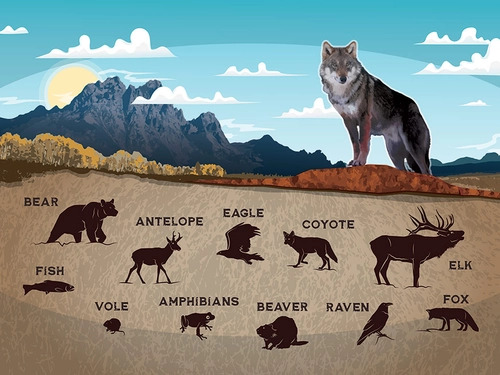Support BSCS
November 3, 2019
Dear friends,
Brittany Hubert teaches her 11th grade biology students about a phenomenon at Yellowstone National Park. For years, she’d tell them: Gray wolves were removed from the park in the 1920s and bad things happened, so they were reintroduced 70 years later and good things happened. Students then learned details throughout an ecology unit. But there was a problem. Students had no reason to care. They already knew how the story ended.
This year, students care. Because now, they are investigating their way through the story.
Brittany begins the unit with one fact: Gray wolves were removed from the park. When she asks students to share their initial ideas about whether this was the right decision, they end up in a debate. Marsha* argues: Yes! It was important to protect humans. Connor adds: Absolutely! The wolves were killing too many organisms. But Stephanie disagrees: It’s not a good idea for humans to interfere with the natural environment.
The debate is lively, and students become highly motivated to investigate real population data. Eventually, they come to a consensus. It was a bad idea to remove the wolves. Now deep into the unit, students want to know: Are the gray wolves ever coming back?
It’s a new classroom dynamic. Brittany is thrilled. So what happened? STeLLA happened, she says.
Brittany recently participated in BSCS Science Learning’s professional learning program, STeLLA® (Science Teachers Learning from Lesson Analysis), which is shown to significantly impact both teacher and student learning. Along with 23 other high school biology teachers in Louisville, Kentucky, Brittany learned how to implement effective teaching strategies, related to student thinking and coherent instruction, through video-based lesson analysis. Now she is a STeLLA facilitator who prepares other science teachers to do the same.
I have 31 kids in my class, but STeLLA lets me personalize their learning, Brittany says. When I “STeLLA-fied” my ecology unit, students became more involved. Now the unit is a story and they have to figure out the ending.
BSCS has introduced and evaluated STeLLA professional learning across a variety of contexts, and our goal is to make the program accessible to educators nationwide. Still, it is only one of many robust programs we are currently advancing in service of our mission to transform science teaching and learning. We are leading large instructional materials development projects, building capacity for next generation science instruction, and pursuing a more equitable and just future for science education all at once.
At BSCS, we secure grants to support our research-driven innovation. But because grants restrict the type of work we can do, we rely on individuals, like you, to support our efforts to expand programs and make them broadly accessible. Your contribution ensures our impact continues beyond the life of funded projects. We hope you will invest in the future of science teaching and learning with a tax-deductible donation to BSCS today.
Sincerely,

Daniel C. Edelson
Executive Director
*All students’ names are pseudonyms.
